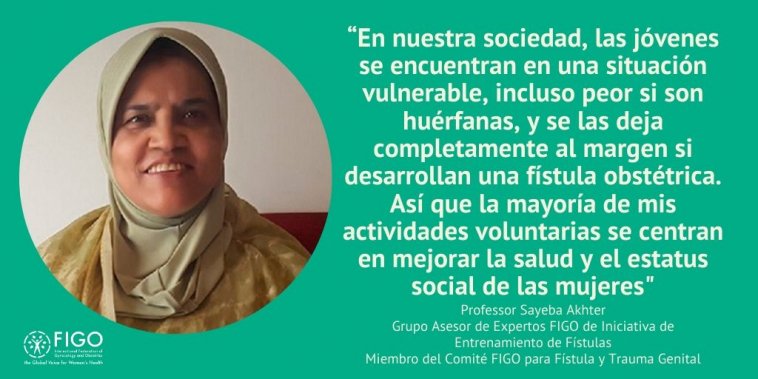Ending obstetric fistula
Meet the professor, teacher, inventor; committed to eradicating obstetric fistula.

More than one billion people volunteer globally – the equivalent of over 109 million full-time workers, according to the UN Volunteers' 2018 report, State of the World’s Volunteerism.
Resilient communities are healthy communities, and FIGO members around the world make a critical contribution. On the frontline of women’s health in 132 countries, they donate their time, expertise, and platforms to improve the physical, mental, reproductive and sexual health of women throughout their lives.
We are proud to celebrate their contributions.
Professor Sayeba Akhter is an OBGYN working in Bangladesh and a driving force in FIGO's Fistula Surgery Training Initiative. Due to a global shortage of trained obstetric fistula surgeons, only one woman in 50 has access to fistula treatment. Working with expert partners, FIGO aims to train enough surgeons to permanently eradicate the condition and give women with obstetric fistula a second chance at life.
What FIGO volunteer opportunities are you currently involved in?
In our society, young girls are in a vulnerable situation, even worse if they are orphans, and utterly cast to the margins if they develop an obstetric fistula. So most of my voluntary activities centre on the improvement of women’s health and social status.
FIGO has been working for the sake of fistula patients for many years now, and I feel proud to be a part of the FIGO Expert Advisory Group for the Fistula Training Initiative.
I have also been a member of FIGO’s Committee for Fistula and Genital Trauma since 2008. We led development of the FIGO Global Competency-Based Fistula Surgery Training Manual, with ISOFS, UNFPA, EngenderHealth and RCOG. It is the world’s first standardised curriculum for training obstetric fistula surgeons, and we now have more than 55 FIGO Fellows (trainee surgeons).
With a mandate to eradicating obstetric fistulae from Bangladesh, I have been working with the Government on policy and strategic planning. But with a view to serving those women already living with fistula, I also work as a visiting professor at a missionary hospital in a remote village.
Why is this an important women’s health issue for you?
Obstetric fistula is a huge injustice to women: a violation of the basic reproductive right to be cared for during pregnancy and childbirth. Their right to live as a human being is also violated. It is an extremely neglected issue and needs to be brought to light: to make it visible across civil society, government and public policy makers.
What motivates you to volunteer?
My motivation started from seeing my teachers in the ‘80s, their devotion and dedication to their fistula patients. The more I work, the more I see their pain and sufferings and am further driven. Obstetric fistula is an unacceptable injustice and cannot be allowed to continue. We have to work harder to prevent it, and to give women back their lives and dignity.
My parents were my earliest motivation. Charity begins at home, and I grew up seeing my parents active in the community where we lived. My father was a Professor at Korotia Sadat College, Tangail and used to go out of his way for poor students, buying cows from one marketplace to sell at another and donate to the Student Benevolent Fund. Thankful to Almighty, in my spouse I have found the same generosity.
What has been your biggest accomplishment in the role?
As the inventor of the ‘Condom Balloon Tamponade’, I have a keen interest in reducing maternal mortality through controlling Post-partum Haemorrhage (PPH). I train doctors and midwives about its use, and consider myself really fortunate to have come up with the idea. Using a condom is a vital alternative resource for poor countries, as an alternative to expensive balloons used in high-resource settings.
This innovation of mine, the pleasure of working for fistula patients, and teaching my students I feel are my biggest accomplishments.
How has your life been shaped by other volunteers?
All my life I have come across so many dedicated volunteers, people who did not even want their contributions to be known to people they helped! These are not the bigshots of society, rather they are common people changing the lives of others through uncommon works.
I was astonished to see a poor rickshaw puller start a small hospital to serve the people of his village. I have seen my mother give her food to a bagger and starving herself during the liberation war of Bangladesh. These stories are not written in books, but are the truths that bring me the real essence of life.